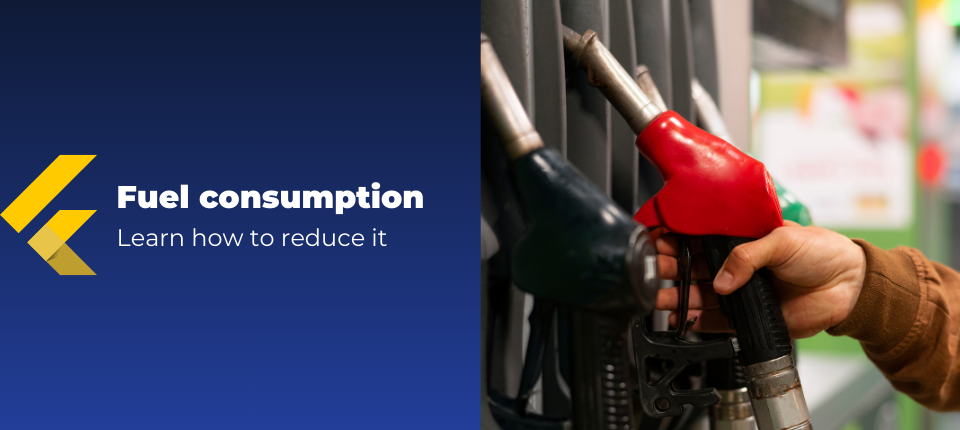Fuel consumption represents one of the largest cost centers for a vehicle fleet. Managing it efficiently can not only reduce expenses but also improve the sustainability score, which is increasingly brought to the forefront. Closely monitoring fuel consumption is crucial for achieving operational efficiency, and using modern solutions like CAN reading can help reduce fuel consumption, increasing the productive use of resources.
Discover the four most common driving practices that cause high consumption. These can be easily corrected through both a proactive approach and the use of an advanced management solution like the one offered by AROBS TrackGPS.
Aggressive driving style
One of the main causes of increased fuel consumption is aggressive driving. Frequent over-revving can directly affect a vehicle’s condition, both in terms of efficiency and its technical state. This habit not only leads to premature wear and tear of vehicle components but can also significantly increase fuel consumption. The major impact is felt in refueling and maintenance costs, but the effect on the carbon footprint of the entire fleet should not be overlooked.
Solution: CAN data reading
Frequent over-revving can be identified by accessing data from the vehicle’s CAN bus. This solution gives fleet managers the ability to analyze this behavior in real-time and implement corrective measures. In this way, aggressive driving styles can be improved, leading to reduced fuel consumption and cost savings.
Extended idling
Idling for extended periods is another common practice that increases fuel consumption. This habit is often observed in urban areas or during deliveries and directly contributes to increased greenhouse gas emissions.
Solution: Idle time analysis
With the AROBS TrackGPS application, fleet managers can identify idling times and the locations where these events occur. This makes it easier to pinpoint when the engine is left idling and take measures to prevent and reduce this practice. As a result, associated fuel costs can be lowered, and the fleet’s carbon footprint can be reduced.
Vehicle malfunctions
Another factor that can lead to significantly increased fuel consumption is technical issues with the vehicle. Dirty air filters, malfunctions in the lambda sensor, airflow meter, or fuel injectors are just a few causes that affect engine performance, resulting in higher fuel consumption.
Solution: Decoding the CHECK ENGINE warning from the CAN bus
The malfunctions mentioned above are always signaled by the illumination of the CHECK ENGINE warning light on the dashboard. The AROBS TrackGPS solution not only records and transmits the appearance of this warning but also has the capability to read DTC error codes, providing an exact indication of the vehicle’s fault. This functionality reduces diagnostic and repair times, ensuring the vehicle quickly returns to normal operational parameters.
Overloading the vehicle
Using a vehicle beyond its load capacity or using an undersized vehicle for a specific task can significantly increase fuel consumption. An overloaded vehicle will not only consume more fuel but also suffer additional wear and tear, leading to increased maintenance costs.
Solution: Identifying overloading situations and taking measures
Using CAN data provided by AROBS TrackGPS, fleet managers can detect if a vehicle operates with higher-than-normal engine RPM, increased fuel consumption, or elevated engine temperature—signs of potential overloading. Once identified and verified, corrective measures can be taken to restore the vehicle’s optimal operation.
Benefits of fuel consumption analysis via CAN
The CAN reading solution developed by AROBS TrackGPS offers numerous advantages for managing a vehicle fleet, including:
Reducing fuel consumption: By identifying and correcting over-revving behaviors that lead to excessive consumption, fleets can lower operating costs and achieve efficient resource utilization.
Improved operational efficiency: Constant monitoring of vehicles via CAN allows for more efficient diagnosis of technical issues, reducing downtime.
Sustainability: Reducing greenhouse gas emissions through lower fuel consumption directly contributes to environmental goals and the company’s carbon footprint reduction.
Proactive problem-solving: AROBS TrackGPS allows for the rapid identification of issues related to driving style or vehicle condition, preventing costly long-term damage.
For any vehicle fleet, fuel consumption is a major cost center. By avoiding inefficient driving practices and using modern technologies like CAN Data Reading from AROBS TrackGPS, fleet managers can achieve significant savings. This not only enables efficient resource utilization but also reduces environmental impact, supporting global sustainability and smart mobility efforts.
AROBS TrackGPS becomes a powerful ally in the process of reducing fuel consumption, improving vehicle performance, and saving long-term costs. Implementing these solutions not only optimizes fleet activity but also increases its sustainability level in the context of current challenges related to carbon footprint reduction.




